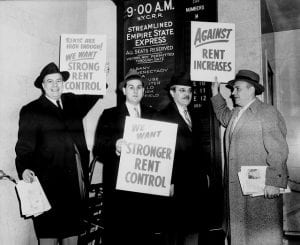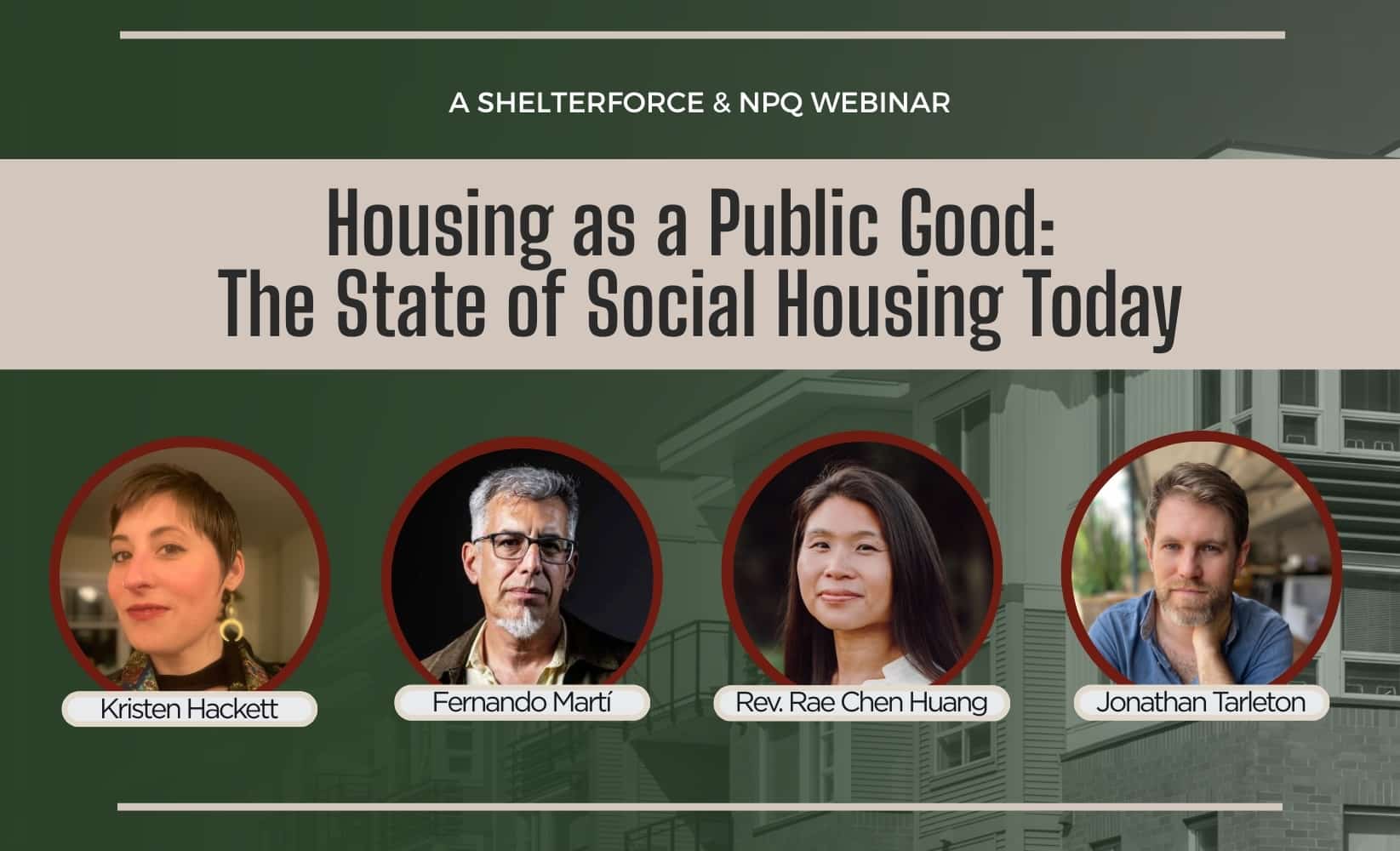
Men in the 1950s protest in support of rent control. Photo by Kheel Center, CC BY 2.0
It was only two and a half years ago that Jake Blumgart opened his article, “In Defense of Rent Control,” by saying: “Rent control is basically dead.”
Mind you, there wouldn’t be a reason to write in defense of it if it were totally dead, and indeed it was a few activists who were talking about reviving it that seemed to have spurred that article. Nonetheless, outside of New York City, that was not a statement many people were ready to argue with.
In many ways, it’s been a long two and a half years since that article came out. But one of those ways is a worsening housing crunch, which in some high-cost areas has led to such a large increase in homelessness that it has reversed the multiyear national trend of homelessness going down.
Along with this, the voices saying that rent control should go back into the toolbox for stabilizing families and neighborhoods have gotten more numerous and loud—and active. It is especially important, rent control advocates note, to establish some sort of stability while we try to rectify the massive lack of supply of permanently affordable housing where the jobs are. There’s a movement in California to get a measure on the ballot in 2018 to repeal the Costa-Hawkins act, which prevents rent control from being applied to buildings built after 1995. It’s not just California—a campaign has begun to reverse legislation in Illinois that prevents local governments from enacting rent control. The national campaign Homes for All, which has been holding renters assemblies around the country, held a meeting on Dec. 18, 2017 to discuss a 2018 campaign on rent control specifically.
I’m glad to see this, since rent regulations are among the most maligned and misunderstood policies out there—in large part because economists like to misrepresent them as a set of simple price ceilings imposed on all apartments (that’s not how they work). If you’re interested in joining this movement, we’ve put together one of our Answer columns on “Do Rent Regulations Make the Housing Crisis Worse?” to help you counter the inevitable push back. If you use it, let us know how!




If more rentals were cooperatively owned by the residents rent control could become obsolete and the industry could look to the cooperatives to determine what it costs operate a particular type building.
Cooperative boards adopt not for profit budgets based upon what they can well estimate costs will be for the coming 12 month period and the pressure from their resident members to keep those costs as low as possible. Their audits at the end of the period generally prove out their estimates. If there is a surplus the boards can decide to use the surplus to fund added reserves or return it to the resident members. If there is a shortage it may well impact the next year’s budget or its reserve levels.
Rentals have to budget to provide a return or profit on the investment. Non profit rentals still budget on what the market will bear in order to provide revenues for other activities of the non profit.
Housing cooperatives provide an answer for most all problems being faced by the public in the rental markets; and cooperatives are rentals but owned and controlled by the “rent” paying resident members.
Herb Fisher
The real issue here is whether (and if so how) property rights should be divided between the owner of the housing and the renter. I understand why renters would want the benefits of ownership — including the ability to remain in occupancy despite the owner’s desire, and the ability to not pay increased rents despite increased value of the unit — to flow to them instead of to the owner — and without having to undertake the burdens of ownership — including not actually having to purchase the property. But I do not understand why the rest of us should agree. Suppose that the rental housing owner is Mr. and Ms. Gutteriez (recent immigrants from El Salavador) who have purchased the property as part of their escape plan from poverty. Why should they subsidize the tenants (perhaps, Mr. and Ms. Ramirez, also recent immigrants, say from Mexico) who also are hoping to escape poverty)? Surely those of us who support opportunities for personal financial advancement — by those willing to make investments and take risk — should want for Mr. and Ms. Guttieriez to realize their vision for prosperity. And it seems to me that the claims for property rights by Mr. and Ms. Guttierez should take precedence over those of Mr. and Ms. Ramierez, because M/M Guttierez laid out the cash (and took the risk) to purchase the property in the first place. And if (hypothetically) the public-policy decision depends on whether the property owner / landlord is someone we approve of (e.g., Mr. and Mr. Guttieriez) instead of someone we don’t approve of (e.g., a publicly traded Real Estate Investment Trust), then we don’t really have the moral high ground, do we? Thus I think the whole “rent control” discussion is not simple in the least. My personal opinion is that rent control is a bad thing (conferring a benefit on long-time renters, at the expense of new renter movers to the neighborhood, generally with a zero-sum effect on those two classes of renters, even though there are legitimate reasons to encourage relocation in order to pursue economic opportunities, thus legitimate reasons to prefer — as a matter of public policy — the interests of in-movers over the interests of existing residents). I’m willing to be persuaded, but thus far the arguments in favor of rent control do not seem persuasive.
I can categorically and with great confidence state that there is no way on earth that the Illinois General Assembly is going to end the state’s pre-emption on rent control. The real estate industry still controls both parties here (and nationally) and you cannot fathom the lobbying — and advertising — effort that will go into killing any attempt to end the ban on local rent control. What we should be seeking is an amendment to the state ban to allow local communities to engage in inclusionary zoning.
But Herb Fisher is quite right when he writes that low-equity cooperatives are the solution. They’ve been the most successful form of affordable housing this nation has ever known. They keep housing affordable to the original target audience without massive government subsidies over the decades. They turn tenants into homeowners. And even more importantly they give tenants control over their housing fate and management. I hate the phrase, but low-equity cooperatives are a ‘win-win” deal for preserving affordable housing in America.